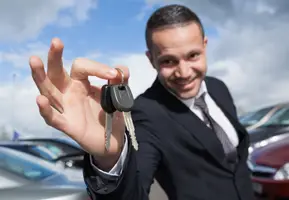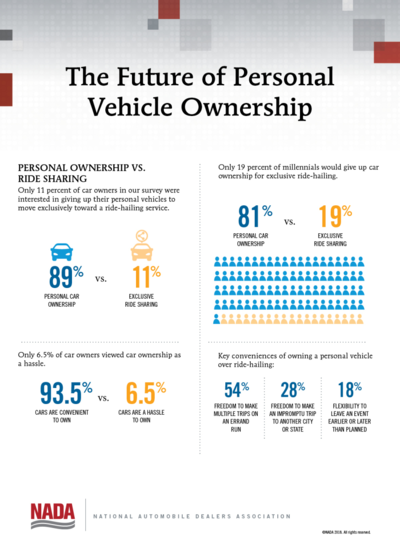The Future of Personal Vehicle Ownership
 |
Silicon Valley and Wall Street have been pushing the false narrative that owning a car is a hassle—an expensive, unnecessary purchase that folks would rather do away with. The survey showed the complete opposite. It found that only 6.5 percent of car owners viewed car ownership as a hassle.
TACH's TAKE:Silicon Valley On Its Way To Disrupt The Auto Industry and The Historic Need For Traditional Car Companies
By Peter Welch
NADA President & CEO
It’s hard to attend an automotive conference these days without hearing about the end of personal vehicle ownership. According to so-called “conventional wisdom,” the proliferation of ride-hailing options like Uber and Lyft combined with autonomous vehicles (AVs) are destined to align and make the prospect of owing your own vehicle too inconvenient or too costly.
I get it. We’re living in exciting, changing times, and technology is normalizing things today that for decades weren’t even on anyone’s radar. We’re also living in an era that rewards bold predictions far more than rationality.
But as we all know, rationality still drives behavior. So the National Automobile Dealers Association (NADA) has been probing to find out what people really think about AVs, ride-hailing, car sharing and personal ownership. NADA commissioned a large-scale research project that included consumer focus groups and a national survey about the future of personal transportation. And what we found cuts against much of the “conventional wisdom.”
Here are the key findings:
Car owners have little, if any, interest in giving up their car keys.
Only 11 percent of car owners in our survey were interested in giving up their personal vehicles to move exclusively toward a ride-hailing service—even under the assumption that the service was widely accessible, safer and more affordable than human-operated vehicles. This was true among all demographics—age groups, geographic regions, and education and income levels.
Cars are convenient to own.
Silicon Valley and Wall Street have been pushing the false narrative that owning a car is a hassle—an expensive, unnecessary purchase that folks would rather do away with. The survey showed the complete opposite. It found that only 6.5 percent of car owners viewed car ownership as a hassle.
Millennials aren’t much different.
Talk to anyone on the topic of millennials and you’ll hear something about how they are a virtually different species of consumer. But millennials in our survey were not that different from the rest of consumers. Only 19 percent of them would give up car ownership for exclusive ridesharing. And most of those were the youngest, most urban and mostly single subset. But put a 30-year-old millennial in the suburbs with kids, and they start looking, thinking and acting just like the rest of us. Actually, millennials are buying new cars at a higher rate today than 10 years ago. Last year, the percentage of new-vehicle sales to consumers under the age of 35 was 19.3 percent vs. 16.6 percent in 2007.
People won’t trade time for money.
According to the U.S. Department of Transportation, the average U.S. household takes about 10 trips per day (stopping at the grocery store on the way home from work counts as two trips). The survey we commissioned found that the ride-hailing users on average waited nine minutes for each Uber or Lyft ride. Do the math—that’s a lot of waiting. And even if ride-hailing services save money, folks aren’t willing to trade their time for that savings. Half of the people surveyed reported that they’d need to save at least $50 per day to compensate for an extra hour of waiting for ride-hailing services. Under the rosiest scenarios, autonomous taxis might lower transportation costs—but nowhere near enough to compensate for the additional cost and inconvenience of waiting.
Bottom line
People want the freedom, flexibility, convenience and control that only vehicle ownership provides.
Fully 90 percent of car owners surveyed said that, at every moment, their car provides them the freedom and flexibility to go where they want, when they want. Respondents cited a number of reasons—including the ability to make multiple trips on an errand-run, take an impromptu trip to another city or state, drive unexpectedly to an emergency room and have the ability to leave an event earlier or later than planned—as key benefits of personal vehicle ownership. Such benefits would all disappear if they relied exclusively on ride-hailing.
The survey found that ride-hailing services provide some great benefits—especially in urban areas and in places where parking is an inconvenience. But if real consumers have anything to say, the future of transportation will be built upon the foundation of personally owned vehicles, whether human operated or autonomous. Consumers will continue to purchase their own vehicles and use ride-hailing services as a supplement whenever it’s more convenient. Consumers want both, not “either/or.” In the future, ride-hailing services will supplement personal vehicle ownership, not supplant it.
This also means that the chief threat to personal vehicle ownership is not the marketplace. It’s the government. In February, Uber, Lyft, Zipcar and Didi Chuzing (China’s largest ride-hailing service) signed a self-serving statement of principles supporting a mandate that all AVs in urban areas be part of shared fleets—not personally owned. That’s not an action of the marketplace—it’s one that would require government intervention. If there’s a threat to personal vehicle ownership, that’s it.
Owning your own vehicle is as American as apple pie. And as local dealerships that represent our customers as much as our businesses, we need to be vigilant about protecting the right of every American to retain the freedom, flexibility, convenience and control of owning their own vehicle and the ability to drive it when and where they want.



